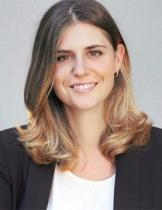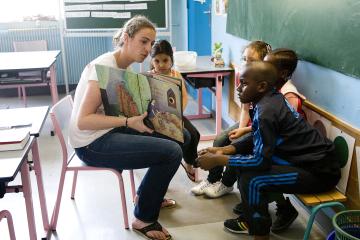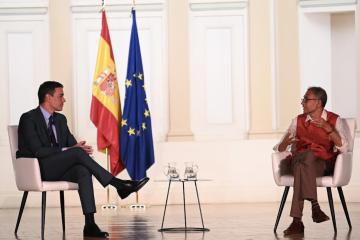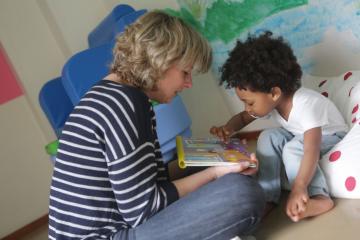
Yhdessä (Together): Creating documentary photography on inclusion and friendship in Finnish schools

We embarked on a documentary photography project to capture the people and activities behind a Finnish primary school intervention aimed at fostering social inclusion in schools. Our aim was to showcase the crucial role of visual storytelling in human-centered research and policymaking—our project aims to connect rigorous research and storytelling by capturing the tangible, human experiences at the core of J-PAL’s work.
Delivered by the Finnish NGO Walter, Kytke operates through dedicated workshops in which athletes and artists with diverse cultural and ethnic backgrounds navigate questions of discrimination, racism, inclusion, and community-building with students. Workshop speakers share personal experiences and encourage students to share their own feelings and thoughts, challenging stereotypes and giving voice to participants. The program is currently being rigorously evaluated through J-PAL’s European Social Inclusion Initiative to understand its impact.
The evaluation of this project is being conducted by J-PAL affiliated professor Michela Carlana alongside Matti Sarvimäki, Mikko Silliman, and Marco Tabellini, researchers based at Harvard and Aalto University.
Diversity and inclusion in Finland through a dual-lens approach
Finland’s population is growing increasingly diverse. In Helsinki, roughly 18 percent of residents speak a foreign language as their native tongue. Recent national discussions have shed light on the fact that not all children born to immigrant parents feel fully Finnish, or embraced by society. Initiatives like Kytke aim to tackle this sense of exclusion by offering workshops and strategies to tackle issues of discrimination and racism, in an effort to foster broad-mindedness among fellow students.
The photos show how students open up and interact in these workshops, capturing a journey towards understanding and respect. The photos document these moments through a dual-lens approach, blending the artistry of professional portraits with the personal snapshots taken by the students themselves. This method not only enriches the visual narrative but also mirrors the blend of external observations and personal insights, which reflects the experiences of researchers and participants in impact evaluations and development projects more broadly.
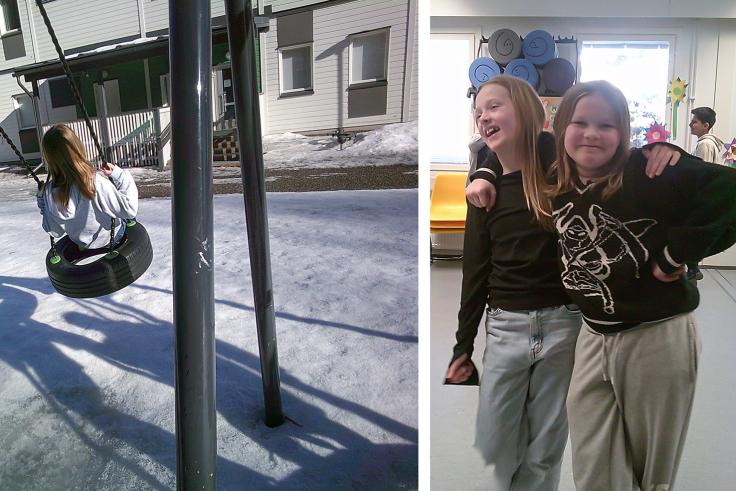
Behind the scenes: Shaping the project's vision
In February 2023, as part of J-PAL's 20th anniversary celebrations, J-PAL launched an internal challenge to generate innovative ideas from affiliated professors and staff around the world to develop new ways to communicate the value of our work. We, Mariajose (Marijo) Silva-Vargas and Ottavia Brussino, from J-PAL Europe, were thrilled to win one of the grants with our idea. Our proposal was to create a digital documentary photography project capturing the essence of one of the impact evaluations funded by J-PAL, making the research and its activities more tangible for academic and non-academic audiences alike.
The concept for our photo exhibit emerged from our combined experience with visual storytelling. Marijo is a development economist and a photographer. During her research on the integration of refugees into the labour market in Uganda, she also documented the impact evaluation process through photography. These photos were later displayed at J-PAL Europe’s June 2023 colloquium, “Science and the Fight against Poverty: How Far Have We Come in 20 Years and What's Next?” This exhibit garnered media attention and was featured in Photo VOGUE, Foto Femme United, Fotografas LATAM, and other documentary outlets.
Ottavia has managed international exhibitions and communications for a photography project led by children in the refugee camp of Samos in Greece. This work not only received international media coverage, including in the Guardian and the New Yorker, but was also exhibited around the world from Australia to the United States.
Prioritising partnerships and ethics in our work
To create this documentary photography project, we first secured collaboration from researchers and project implementers. We consulted with the researchers and Kytke staff to develop a plan to capture professional photographs of the project while incorporating the students' perspectives. To address ethical considerations, we developed a specific protocol and consent form. These documents were essential for obtaining parental permission both for photographing the students and for empowering the students to take pictures themselves. Only those children who received parental consent were allowed to participate in the photography project.
In March 2024, we traveled to Finland for a week and collaborated closely with the Kytke team. We attended workshops in various schools, where we provided digital cameras to the students. During these sessions, Marijo also captured professional portraits of the students, project implementers and others involved. We then translated the project into a digital exhibition on the J-PAL website where people can view the photographs.
Blending storytelling with rigorous research: A final reflection
We believe that combining the precision of randomised evaluations with the spontaneity of photography creates a compelling contrast. This blend of rigorous research and expressive storytelling not only documents findings but also highlights personal stories, transforming data into narratives of experiences and community aspirations. The camera illuminates the human side of impact evaluation and research.
The realisation of this project would not have been possible without the support of Jan Wieland and Nicole Stiles, Kytke project coordinators, and guidance by researchers: J-PAL affiliated professor Michela Carlana and Matti Sarvimäki, Mikko Silliman, and Marco Tabellini.
